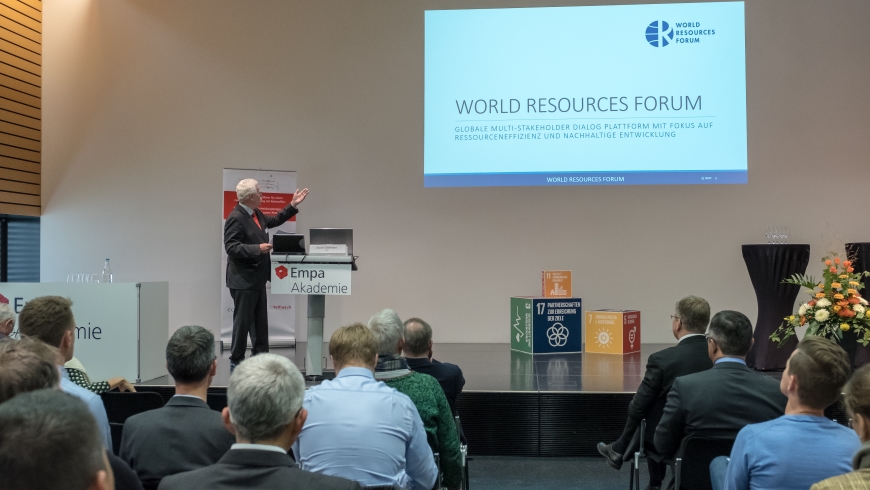2nd Resources Forum Switzerland at Empa
Circular economy: an opportunity for Switzerland
On 25 October, the second edition of the Swiss Resource Forum took place at the Empa Academy in Dübendorf. The motto of this year's edition of the Forum was «Science, business and cities working together for greater resource efficiency».

The Swiss population has too large an ecological footprint: we emit too much carbon dioxide (CO2), pollute too much water and consume too many resources. According to a new report by the Federal Office for the Environment (FOEN), although the environmental impact per person in Switzerland has been declining steadily since the mid-1990s, our ecological footprint is still to large: if everyone were to pollute the environment as much as the average Swiss, we would need more than three earths to cover our demand for resources.
How we can reduce our consumption of resources and what opportunity this could provide for Switzerland was the theme of this year's edition of the Swiss Resource Forum, which took place on 25 October at Empa in Dübendorf. It is clear that this is not possible without the involvement of all stakeholders. Accordingly, the title of the forum was «Science, business and cities working together for greater resource efficiency».
More resource-efficient means more competitive
«Low-resource countries like Switzerland must become resource-efficient,» stressed Gunter Stephan, President of the Steering Committee of the National Research Programme «Sustainable Economy» (NRP 73). An economy that focuses on resource efficiency will have advantages in future international competition - because it will be protected against the looming shortage and rising cost of raw materials. «Environmental and efficiency technologies are the growth and lead markets of the future,» says Stephan.
Xaver Edelmann, former Empa Director and current Vice President of the World Ressources Forum (WRF), formulates the great goal of the circular economy: Wealth and economic growth must be decoupled from environmental degradation. To achieve this, however, it is not enough simply to recycle as many products and recyclable materials as possible. The rethink must begin much earlier: In the design of products and services - and in our demands.
Reduction and sufficiency is also a catchword that Jacky Gillmann, Chairman of the Board of the Losinger Marazzi construction and real estate company, is concerned with: Do we really need more than 45 square meters of living space per person - or are 30 enough, as was the case in the 1970s? Nevertheless, we shouldn't go back to bygone times - on the contrary: Gillmann sees great potential in technological progress, for example in saving resources in the construction sector, for example in improving planning thanks to the digital modelling and planning method BIM or thanks to new production methods such as 3D printing.
Michael Pöll of the Office for Building Construction of the City of Zurich impressively demonstrated what happens to the resources in a building when it is dismantled: While most of the concrete, asphalt, rock and steel scrap are recycled, all of the plastics used end up in landfills. There is enormous untapped potential here - but the devil is in the details: In buildings that are currently being demolished, substances that are banned today - such as asbestos, lead and cadmium in PVC floor coverings and pipes, and the flame retardant HBCD in insulating materials - were used primarily in the plastics.
Catherine de Wolf from EPFL and Marco Grossmann from ecos, a sustainability consulting firm, addressed the issue of recycling management in cities. This is no coincidence, as cities are gigantic users of raw materials: more than three quarters of all resources and between 60 and 80% of energy are consumed in cities.
Circular economy and post-fossil cities
In the afternoon, three different workshops offered the opportunity to deepen knowledge and discuss complex issues. The NRP 73 invited to the workshop «Circular Economy in the construction industry», where the participants discussed how and whether the idea of the circular economy can be realised in the construction industry - from an economic, ecological, organisational and political point of view. How a city could function in the post-fossil age was demonstrated in the second workshop by the simulation game «Post-fossil Cities» - an Empa project within the framework of NRP 73. The third workshop was dedicated to the topic of efficiency in companies in a practical context: What do efficient solutions in the materials and energy sectors look like? How can companies learn from each other?
A raw materials market enabled visitors to discover the diversity of Swiss initiatives and networks that already exist today and are working on countless projects to turn raw materials around by means of an interactive poster exhibition. By visiting NEST, the participants also had the opportunity to learn more about innovative solutions in the building sector.
The Swiss Resource Forum is an initiative of a broad group of organisations, including the WRF, the FOEN, Empa, the Swiss Academies of Sciences, ecos, the Swiss Mineral Resources Network NEROS, the Swiss Network for Sustainable Management Öbu and the Development Fund Rare Metals (ESM). Through conferences such as the Swiss Resource Forum, decision-makers from business and politics as well as actors from research, public administration and NGOs are to network.
-
Share
